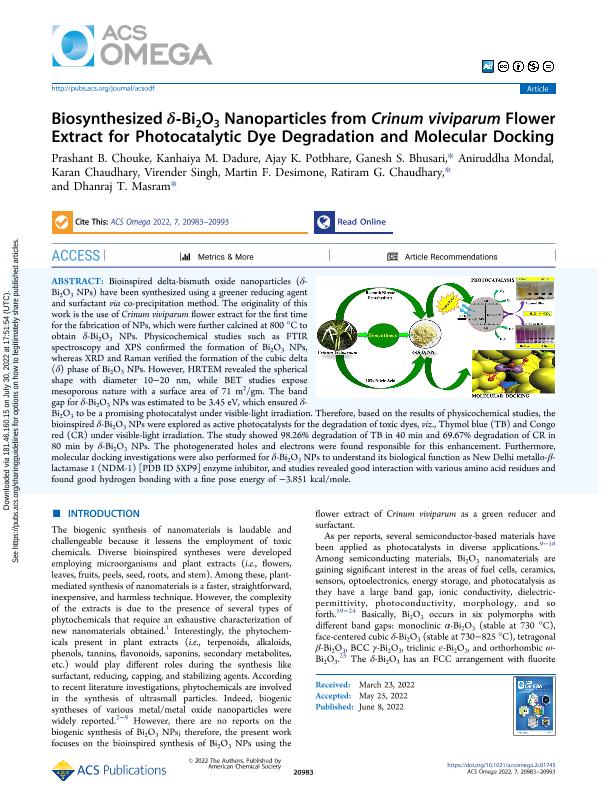Artículo
Biosynthesized δ-Bi2O3Nanoparticles from Crinum viviparum Flower Extract for Photocatalytic Dye Degradation and Molecular Docking
Chouke, Prashant B.; Dadure, Kanhaiya M.; Potbhare, Ajay K.; Bhusari, Ganesh S.; Mondal, Aniruddha; Chaudhary, Karan; Singh, Virender; Desimone, Martín Federico ; Chaudhary, Ratiram G.; Masram, Dhanraj T.
; Chaudhary, Ratiram G.; Masram, Dhanraj T.
 ; Chaudhary, Ratiram G.; Masram, Dhanraj T.
; Chaudhary, Ratiram G.; Masram, Dhanraj T.
Fecha de publicación:
06/2022
Editorial:
American Chemical Society
Revista:
ACS Omega
e-ISSN:
2470-1343
Idioma:
Inglés
Tipo de recurso:
Artículo publicado
Clasificación temática:
Resumen
Bioinspired delta-bismuth oxide nanoparticles (δ-Bi2O3NPs) have been synthesized using a greener reducing agent and surfactant via co-precipitation method. The originality of this work is the use of Crinum viviparum flower extract for the first time for the fabrication of NPs, which were further calcined at 800 °C to obtain δ-Bi2O3NPs. Physicochemical studies such as FTIR spectroscopy and XPS confirmed the formation of Bi2O3NPs, whereas XRD and Raman verified the formation of the cubic delta (δ) phase of Bi2O3NPs. However, HRTEM revealed the spherical shape with diameter 10-20 nm, while BET studies expose mesoporous nature with a surface area of 71 m2/gm. The band gap for δ-Bi2O3NPs was estimated to be 3.45 eV, which ensured δ-Bi2O3to be a promising photocatalyst under visible-light irradiation. Therefore, based on the results of physicochemical studies, the bioinspired δ-Bi2O3NPs were explored as active photocatalysts for the degradation of toxic dyes, viz., Thymol blue (TB) and Congo red (CR) under visible-light irradiation. The study showed 98.26% degradation of TB in 40 min and 69.67% degradation of CR in 80 min by δ-Bi2O3NPs. The photogenerated holes and electrons were found responsible for this enhancement. Furthermore, molecular docking investigations were also performed for δ-Bi2O3NPs to understand its biological function as New Delhi metallo-β-lactamase 1 (NDM-1) [PDB ID 5XP9] enzyme inhibitor, and studies revealed good interaction with various amino acid residues and found good hydrogen bonding with a fine pose energy of -3.851 kcal/mole.
Palabras clave:
Bioinspired
,
Bismuth oxide nanoparticles
,
Green synthesis
,
Nanomaterials
Archivos asociados
Licencia
Identificadores
Colecciones
Articulos(IQUIMEFA)
Articulos de INST.QUIMICA Y METABOLISMO DEL FARMACO (I)
Articulos de INST.QUIMICA Y METABOLISMO DEL FARMACO (I)
Citación
Chouke, Prashant B.; Dadure, Kanhaiya M.; Potbhare, Ajay K.; Bhusari, Ganesh S.; Mondal, Aniruddha; et al.; Biosynthesized δ-Bi2O3Nanoparticles from Crinum viviparum Flower Extract for Photocatalytic Dye Degradation and Molecular Docking; American Chemical Society; ACS Omega; 7; 24; 6-2022; 20983-20993
Compartir
Altmétricas



